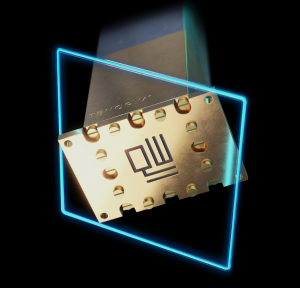DELFT, Netherlands, Feb. 23, 2023 — QuantWare, the leading provider of large-scale superconducting quantum processors, has launched Tenor, a new processor which features a massively scalable technology and enables quantum computers with 64 fully controllable qubits to be built commercially.
 Superconducting qubits have led the quantum computing race for the last few decades, but have yet to scale to truly useful qubit counts because of scaling bottlenecks. Previous generation devices have been planar: the connections between the qubits and the outside world were routed to the edges of the chip. This limits the number of qubits to the numbers seen today.
Superconducting qubits have led the quantum computing race for the last few decades, but have yet to scale to truly useful qubit counts because of scaling bottlenecks. Previous generation devices have been planar: the connections between the qubits and the outside world were routed to the edges of the chip. This limits the number of qubits to the numbers seen today.
QuantWare has developed a patented 3D technology that routes the connections vertically, making it possible to scale superconducting quantum processors to thousands of qubits – opening the door to ‘quantum advantage’ where quantum computers will overtake the most powerful classical computer. Tenor marks a significant advance in commercial quantum computing because it is the first device commercially available that features this technology.
The quantum processor features 64 fully controllable qubits, which is a device with more than twice the number of qubits than the previously largest available quantum processor. Because the qubits are fully controllable, these processors are very suitable for powerful error-correction schemes. Such a design requires more connections per qubit than the often used fixed frequency qubits, and as such were impossible at a scale of 64 qubits with conventional planar devices. QuantWare unlocks these powerful devices for the quantum community by bringing its technology to the market at a 10x lower price point than competing solutions.
QuantWare’s aim is to become the ‘Intel of quantum computing’ by providing easy-to-use, increasingly powerful and affordable quantum processors to organisations across the world. Last year, QuantWare was selected to deliver quantum processing units for Israel’s first fully functional quantum computer.
“The technology on which Tenor is built will massively scale the size of the devices available to the quantum market in the coming years”, said Matthijs Rijlaarsdam, CEO of QuantWare. “There are scores of great quantum computing solutions but there hasn’t been the tech available to enable them to significantly scale – until now.
“Similar to how the emergence of fabless companies revolutionized the semicon industry by significantly lowering the bar to entry, we will be able to provide the design elements and fabrication that will enable many more quantum startups to scale, innovate and compete.”
To learn more about QuantWare’s Tenor, visit this webpage.
This project was partially funded by the European Union. Views and opinions expressed are however those of the author(s) only and do not necessarily reflect those of the European Union or the European Innovation Council. Neither the European Union nor the granting authority can be held responsible for them.
About QuantWare
QuantWare is a TU Delft / QuTech spin-out that develops, designs and fabricates scalable, superconducting quantum processors. By supplying these processors to third parties, QuantWare allows them to build a quantum computer for 1/10th the cost of competing solutions. The company develops technology that will massively scale the number of qubits in a single processor, to create processors that can perform useful quantum computation in the near term.
Source: QuantWare



























































